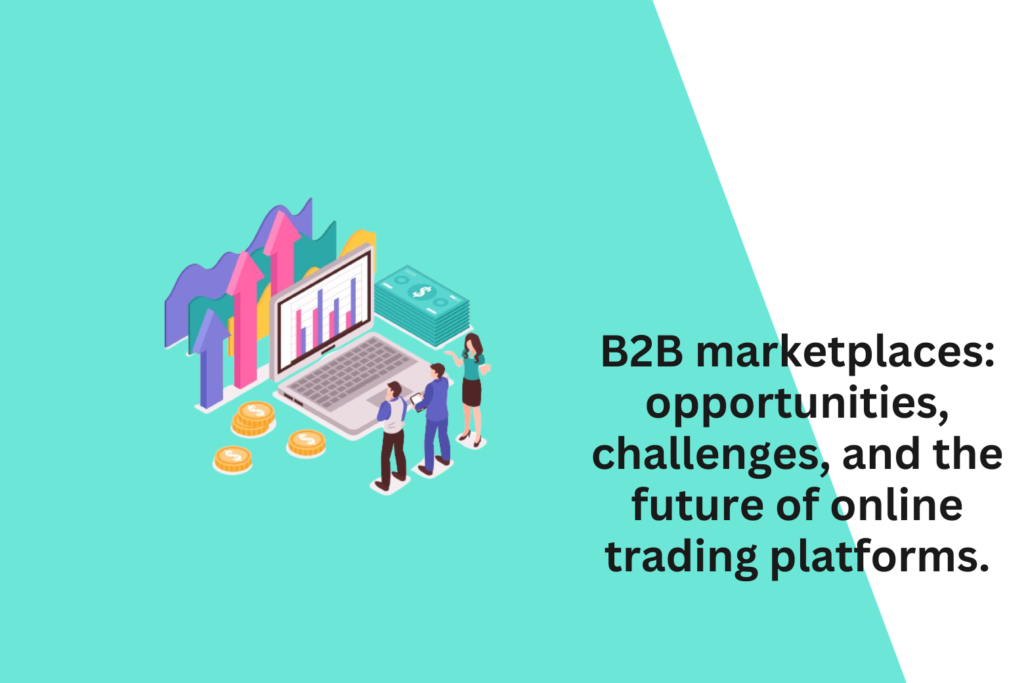
B2B marketplaces, online platforms that connect businesses for buying and selling goods and services, have experienced significant growth, presenting both opportunities and challenges. Here’s an overview of the key aspects related to B2B marketplaces, including opportunities, challenges, and the future outlook:
Opportunities:
Global Reach and Expansion:
- B2B marketplaces provide businesses with the opportunity to reach a global audience. Small and medium-sized enterprises (SMEs) can expand their market presence beyond geographical boundaries.
Increased Visibility and Access to Buyers:
- Businesses gain increased visibility by listing their products or services on B2B marketplaces. This exposure can lead to more opportunities as companies can be discovered by a wider range of potential buyers.
Efficiency and Streamlined Processes:
- B2B marketplaces streamline the procurement process, making it more efficient for businesses to discover, evaluate, and purchase products or services. This can result in time and cost savings.
Diverse Product and Service Offerings:
- B2B marketplaces often host a diverse range of products and services from various suppliers. Buyers can explore a wide array of options, fostering competition and enabling them to make informed choices.
Digital Transformation:
- Participating in B2B marketplaces encourages businesses to embrace digital transformation. This shift includes adopting e-commerce practices, electronic transactions, and digital collaboration tools.
Data-Driven Decision-Making:
- B2B marketplaces generate valuable data on buyer behavior, preferences, and market trends. Businesses can leverage this data for informed decision-making and strategy formulation.
Challenges:
Security and Data Privacy Concerns:
- Security concerns related to data privacy, transaction security, and protection of sensitive business information are challenges that need to be addressed to build and maintain trust among participants.
Integration with Existing Systems:
- Integrating B2B marketplace platforms with existing enterprise systems, such as ERP and CRM, can pose challenges. Seamless integration is crucial for efficient operations and data consistency.
Quality Assurance and Trust:
- Ensuring the quality of products and services listed on B2B marketplaces is essential. Establishing trust among buyers and sellers is crucial for long-term success.
Complex Sales Processes:
- B2B transactions often involve complex sales processes, negotiation, and customization. Adapting these processes to an online platform requires careful consideration and user-friendly interfaces.
Dependency on Platform Providers:
- Businesses that heavily rely on B2B marketplace platforms may face challenges related to changes in terms, fees, or policies set by the platform providers. A high level of dependency can lead to vulnerability.
Supplier and Buyer Vetting:
- Vetting and verifying the credibility of both suppliers and buyers is a critical challenge. Establishing a robust verification process is necessary to mitigate the risk of fraudulent activities.
Future Outlook:
Emergence of Industry-Specific Marketplaces:
- The future may see the rise of industry-specific B2B marketplaces catering to the unique needs of particular sectors. These platforms can provide specialized solutions and targeted audiences.
Increased Adoption of AI and Automation:
- Artificial intelligence and automation will play a larger role in B2B marketplaces. These technologies can enhance search capabilities, automate routine tasks, and provide personalized recommendations.
Blockchain for Trust and Transparency:
- Blockchain technology may be increasingly integrated to enhance trust and transparency in B2B transactions. Smart contracts and decentralized ledgers can streamline processes and reduce fraud.
Greater Personalization and Customization:
- B2B marketplaces will likely focus on providing more personalized and customized experiences for users. This includes tailored product recommendations, pricing structures, and user interfaces.
Collaboration Tools Integration:
- Integration of collaboration tools within B2B marketplaces will facilitate smoother communication between buyers and sellers. Real-time chat, video conferencing, and document sharing can be seamlessly embedded.
Focus on Sustainability and Ethical Practices:
- B2B marketplaces may increasingly emphasize sustainability and ethical business practices. Buyers may prioritize suppliers who adhere to environmental and social responsibility standards.
Augmented and Virtual Reality Integration:
- Integration of augmented reality (AR) and virtual reality (VR) technologies may enhance the B2B purchasing experience. Buyers can virtually inspect products and experience them before making decisions.
Enhanced Security Measures:
- B2B marketplaces will continue to invest in advanced security measures to address concerns related to data privacy and cyber threats. Secure authentication, encryption, and regular audits will be prioritized.
B2B marketplaces will continue to evolve, driven by technological advancements and changing business dynamics. Businesses that strategically navigate the opportunities and challenges in this space are poised to benefit from the future growth and innovation in online trading platforms.



